Reduce Waste Emissions, Reduce Chemical Emissions, Biodiversity Preservation
Initiatives to Reduce Waste Emissions
Waste Governance
Kyowa Kirin Group is tightening its waste governance system and implementing resource recycling.
Our Group makes it a rule to not only audit waste disposal service providers upon concluding contracts with them, but also to conduct periodic audits to check that their services are of high quality in order to help prevent illegal dumping. In addition, Group-wide efforts are made to enhance awareness of waste governance, such as by providing waste management personnel with ongoing education. We intend to step up measures to build a more secure and effective waste governance system.
Zero Emission Activities
Waste generated across the entire Kyowa Kirin Group’s sites in Japan*1 reached 1,277 tons in 2021. The final landfill disposal volume was reduced to 0.03 tons in 2021, accounting for 0.002% of the waste generated. Zero emission*2 was therefore achieved. We will continue with our efforts to reduce waste.
Changes in waste volume and final landfill disposal rate*1
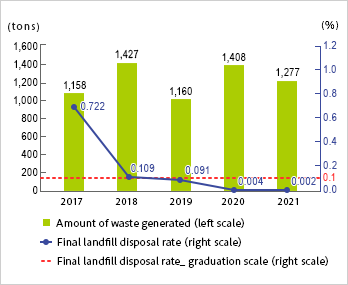
Overall flow of waste recycling and disposal (FY 2021)*1
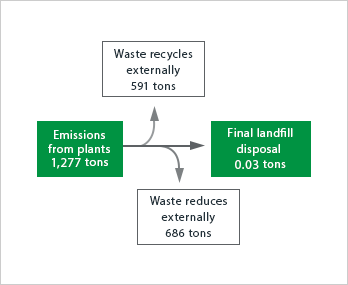
- *1:The plants and research laboratories of Kyowa Kirin Group in Japan are covered.
- *2:“Zero emission” : Kyowa Kirin Group uses the term to mean a reduction in the amount of waste disposed in landfills to no more than 0.1% of generated waste.
Proper Treatment of Polychlorinated Biphenyls (PCBs)
With regard to the proper disposal of PCBs, condensers, transformers, circuit breakers, and lighting ballasts used in the past are locked and stored in warehouses that prevent underground seepage in accordance with the specially controlled industrial waste management standards, and are all disposed of in accordance with relevant laws and regulations and by the stipulated deadlines.
You can see this table by scrolling horizontally.
| Capacitor/transformer/circuit breaker | 0 unit |
|---|---|
| Lighting ballast | 0 unit |
| Oil containing low-concentration PCBs | 0 L |
(Stored amount as of end of December 2021)
Initiatives to Reduce Chemical Emissions
Initiatives to Reduce VOC Emissions and PRTR Substances Emissions
In striving to reduce emissions of chemical substances, the Kyowa Kirin Group has focused its activities on reducing emissions of volatile organic compounds (VOCs).
As a result, the Kyowa Kirin Group's overall domestic VOC emissions remained at a very low level of 0.05 tons as of 2021. We will continue with our efforts to modify our production processes to eliminate the use of VOCs and, when installing new facilities using VOCs, to concurrently install highly efficient VOC removal facilities.
The total emission of Class I designated chemical substances of the entire Kyowa Kirin Group in Japan in fiscal 2021 under the PRTR Act was 0.03 tons (0.03 tons in the previous year), which remains at a low level. We are also appropriately managing chemical substances other than PRTR Act-designated Class I chemical substances in compliance with relevant laws and regulations. We will continue our efforts to control chemical substance emissions.
You can see this table by scrolling horizontally.
| Indicator | Unit | Scope of Coverage | 2019 | 2020 | 2021 |
|---|---|---|---|---|---|
| VOC Emissions | t | Domestic | 0.05 | 0.07 | 0.05 |
| VOC Emission Intensity | t/100 billion yen (sales revenue) | Global | 0.01 | 0.02 | 0.01 |
| Ozone Depleting Substance (ODS) Emissions | t | Domestic | 0.005 | 0.003 | 0.003 |
| PRTR Substance Emissions | t | Domestic | 0.02 | 0.03 | 0.03 |
Details on emissions of PRTR Act-designated Class I chemical substances are available in the ESG Data Collection.
Initiatives to Prevent Air Pollution
Kyowa Kirin Group is taking rigorous measures to switch fuel sources for boilers and make capital investments to maintain emissions of sulfur oxides (SOx), nitrogen oxides (NOx) and dust, which are indices of air pollution, at low levels.
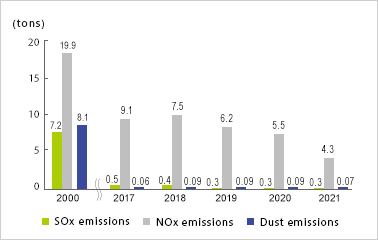
- *1:In Japan, the plants and research laboratories of Kyowa Kirin Group are covered.
Initiatives for Biodiversity Preservation
Activities to Preserve Water-source
Preserving the water resources that sustain the interconnection of lives helps maintain the ecosystem and preserve biodiversity.
As part of its activities to conserve the ecosystem and biodiversity, Kyowa Kirin Group has been endeavoring to preserve water by engaging in the Kirin Group’s water-source preservation project since fiscal 2007. The Takasaki Plant, the mainstay plant for pharmaceuticals, and the Ube Plant perform weeding and tree thinning every year in an effort to preserve forests that provide water resources. These activities were scheduled for fiscal 2021 as well but they were cancelled to prevent COVID-19 infection. We intend to continue these activities in 2022 and beyond.
The Takasaki Plant entered into a three-party agreement with Gunma Prefecture and Kurabuchi Furusato Public Corporation, under which it has been engaging in the Kyowa Kirin Takasaki Water Source Forest Conservation Activities. In addition, our activities for over 10 years was recognized as the efforts to preserve and nurture green forests in Gunma Prefecture. As a result, Kyowa Kirin received the Gunma Prefecture Environmental Award (Environmental Achievement Award) in 2018.
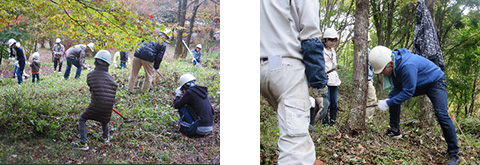
Activities to Preserve Biodiversity
Kyowa Kirin Group has been engaged in a variety of activities through its respective business sites to preserve the ecosystem in collaboration with local communities. Specific examples include cleaning the local river (Kise River, Shizuoka Prefecture; Sakai River, Tokyo), releasing young amago trout into a river (Momozawa River, Shizuoka Prefecture), and preserving grasslands (Akiyoshidai, Yamaguchi Prefecture). The fuji site has been cleaning up the nearby Kise River through Shizuoka Prefecture’s River Friendship Program in collaboration with Numazu civil engineering office and Nagaizumi Town. The Tokyo Research Park has been participating in its local Sakai River cleaning program as a co-sponsor as part of its efforts to help solve the issue of plastic waste under the Kirin Group Plastic Policy. Although some of our activities were restricted in fiscal 2021 due to COVID-19, we will continue to foster local communities and raise awareness of beautification and conservation of the natural environment through these activities.
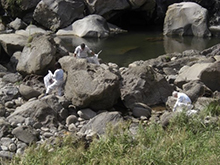
We comply with the Kirin Group’s Guidelines on Access to Genetic Resources in gaining access to raw materials and specimens and sharing the benefits arising out of their use with local communities that provide them.
Furthermore, to comply with the Act on the Conservation and Sustainable Use of Biological Diversity through Regulations on the Use of Living Modified Organisms (Cartagena Act), we have put in place an internal committee to conduct proper management.
Activities to Protect Forests
The Kirin Group Action Plan for the Sustainable Use of Biological Resources declares that the Group will be using paper confirmed to be from sustainable sources for 100% of paper containers and packaging by 2030, with all other paper being recycled paper or paper whose production has been verified as taking sustainability into consideration, and the Kyowa Kirin Group has been introducing FSC®-certified products* under this plan.
We have heretofore adopted FSC®-certified products for copy paper, company envelopes, company brochures, and cardboard boxes for product packaging.
Going forward, we plan to continue considering the use of FSC®-certified products for inner product boxes and other items.
By introducing FSC®-certified products, we will contribute to the health of the world's forests and help preserve biodiversity.
- *:FSC® (Forest Stewardship Council®) certification is an international certification system for responsibly managed forests and responsible sourcing of forest products that are environmentally conservative, socially beneficial, and economically sustainable.
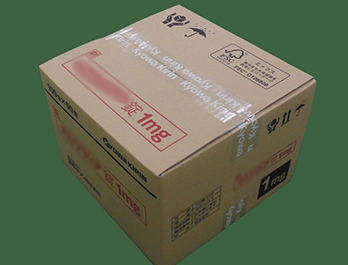
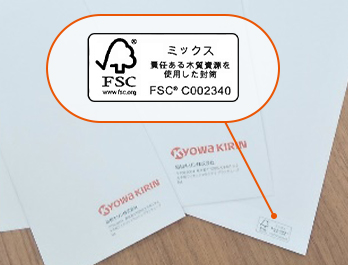
Kyowa Kirin has acquired FSC® promotion license (FSC® N003037).